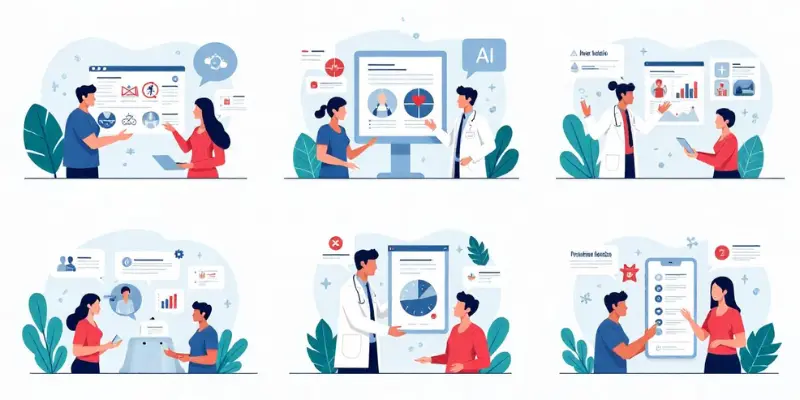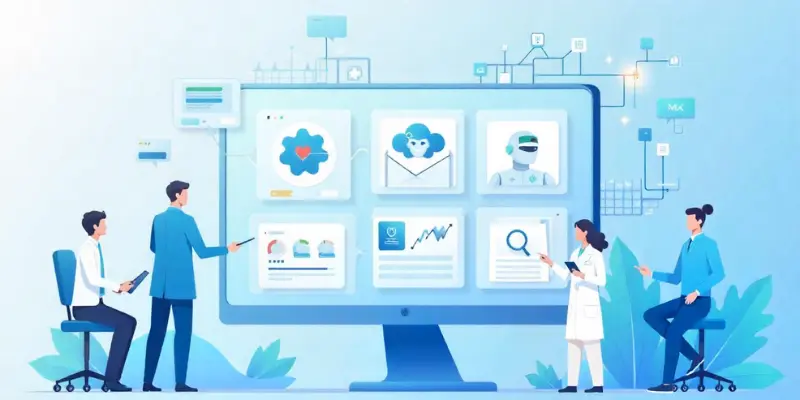How AI Is Changing Healthcare Marketing (And Why It Matters)
Published: 14 Apr 2025
Struggling to get patients to open your emails or book appointments? You’re not alone. Many clinics and health brands find marketing hard and time-consuming. That’s where AI healthcare marketing makes a big difference. It helps you reach the right people, save time and finally see better results.
This article is about how AI helps in healthcare marketing with ready to use templates, content and much more. Let’s dive in and find out.

What Is AI in Healthcare Marketing?
AI in healthcare marketing means using smart computer tools to reach the right patients. These tools can learn from data and help in making better choices faster.
Let’s break it down.
Imagine you run a small clinic. You want to send reminders to your patients, post useful health tips online and answer questions on your website. That’s a lot to handle, right? AI can do many of these tasks for you and often does them better than experienced doctors.
It looks at things like:
- What people search for online
- What health services they had used before
- What questions they ask on your website
Then it helps you talk to those patients in the best way through emails, texts, ads or chatbot messages.
Suggested Article: How to Boost Your Career in Healthcare AI
Example:
Let’s say a person keeps searching for “skin care tips” or “best dermatologist near me.” AI tools can notice that and suggest your clinic’s skin care services to them automatically.
In short, AI in healthcare marketing is like having a smart assistant that helps you:
- Understand your patients better
- Save time on boring tasks
- Share the right message with the right person
And the best part? You don’t need to be a tech expert to start using it.
Suggested article to read: Is the Healthcare AI Stock Market beneficial?
Key Ways AI Is Used in Healthcare Marketing
AI helps healthcare providers talk to patients in smarter and more helpful ways. It looks at what people do online, what services they use and what they need next. Then it helps you send the right message at the right time.

Let’s look at the most common ways AI is changing healthcare marketing.
A. Personalized Patient Messaging
AI can study patient behavior and send messages that feel more personal. It doesn’t just send the same email to everyone. Instead, it looks at things like age, location or past visits and then sends a message that fits.
✅ Example:
If a woman just had a baby, she might start getting updates about baby care, new mother health tips or pediatric services.
💡 Tip:
Use email platforms like Mailchimp or Brevo that offer AI-based tools to personalize your email content.
B. Chatbots and Virtual Assistants
Chatbots are little helpers on websites. They talk to patients, answer basic questions and help with booking even when your office is closed.
These bots are powered by AI. They learn from past chats and keep getting better.
✅ Example:
A hospital chatbot can help patients find a doctor, check hours or book an appointment without needing a phone call.
💡 Tip:
Tools like Tidio, Intercom or Drift are great for adding chatbots to your website.
Also Read: AI as Caregiver in Healthcare
C. Predicting What Patients Need
AI can guess what a patient might need next. It does this by studying past behaviors, search habits or health records.
This is called predictive marketing and it helps clinics to offer the right service before the patient even asks.
✅ Example:
If someone often searches “joint pain” and visits a sports injury page, AI might suggest your orthopedic services.
💡 Tip:
Use Google Trends or AI-powered CRMs to learn more about what your audience is looking for.
D. Social Media and Ad Targeting
AI helps you run smarter ads on social media or Google. Instead of showing your ad to everyone, it picks the people who are most likely to care.
It learns from clicks, likes, shares and even comments.
✅ Example:
A clinic offering diabetes care can show Facebook ads only to people searching for “diabetes symptoms” or engaging with health blogs.
💡 Tip:
Try Meta Ads Manager or Google Ads. They use AI to find your ideal audience.
E. Measuring What Works
AI doesn’t just help you send messages. It also tells you what’s working and what’s not. This is called AI analytics.
It can track:
- How many people opened your email
- Who clicked your ad
- Which service pages get the most visits
✅ Example:
If your ad for heart checkups gets 100 clicks but no bookings, AI tools can suggest ways to improve it.
💡 Tip:
Use free tools like Google Analytics or paid tools like HubSpot to track performance.
AI tools are like your marketing team’s secret weapon. They work behind the scenes—learning, testing and improving every day. Even small clinics can use them to compete with bigger healthcare brands.
Benefits of Using AI in Healthcare Marketing
AI is not just a fancy tech trend—it actually helps. It saves time, improves results and makes patient communication easier. Whether you’re running a small clinic or managing a big hospital, using AI in your marketing campaigns can bring real benefits.

Let’s look at what it can do for you.
1. Saves Time on Repetitive Tasks
AI tools can handle things like:
- Sending appointment reminders
- Replying to common patient questions
- Sorting patient feedback
That means your team spends less time on small jobs and more time on patient care.
2. Sends the Right Message to the Right Person
Not every patient wants the same thing. Some need dental checkups. Others are looking for skin care. AI sends messages that match each person’s needs.
3. Improves the Patient Experience
Patients like fast replies, helpful info and smooth booking experiences. AI can help with all three. It has been seen that hospitals using AI aided marketing get repeat patients.
4. Helps Small Clinics Compete with Big Brands
Big hospitals often have large marketing teams. But AI levels the playing field. Even a small clinic can reach the right audience using smart tools and strategies.
5. Shows You What’s Working (And What’s Not)
AI can track every click, call and sign-up. You will know what’s helping you grow and where you should make changes.
Quick Summary of Benefits
| Benefit | How It Helps You |
| Saves time | Automates follow-ups & messages |
| Personalizes content | Sends better-targeted messages |
| Boosts patient satisfaction | Fast answers & helpful tools |
| Supports small clinics | Affordable, easy-to-use tools |
| Tracks success | Shows what to improve |
AI doesn’t just make marketing smarter, it makes it easier. And for busy healthcare teams, that’s a big win.
Common Challenges in AI Healthcare Marketing (and How to Handle Them)

AI can do a lot but it’s not always smooth sailing. Like any tool, it comes with a few bumps. The good news? You can fix most of them with the right steps.
Let’s look at the most common problems and how to deal with them.
1. Not Knowing Where to Start
The Problem:
Many clinics want to use AI but don’t know which tool to try first.
How to Fix It:
Start small. Try one simple tool like a chatbot or an email platform with AI features. You don’t need everything at once. Look for tools that are beginner-friendly. For example Mailchimp, Tidio or Zoho CRM offer free trials and easy guides.
2. Data Privacy and Patient Trust
The Problem:
AI tools often use patient data. That can raise concerns about privacy and trust.
How to Fix It:
Always follow privacy rules like HIPAA in the U.S. or GDPR in the UK/EU. Look for those AI tools that follow the rules. Use secure tools and explain to patients how their data is kept safe. Write a short privacy note on your website. Let patients know you are using smart AI ools and their info stays protected.
3. Too Many Tools, Not Enough Time
The Problem:
There are hundreds of AI tools out there. It’s easy to get overwhelmed.
How to Fix It:
Pick tools that do more than one thing. Use platforms that combine email, chat and analytics in one place. Fewer tools = less stress. Platforms like HubSpot or Brevo offer all-in-one marketing features with AI support.
4. Getting Poor Results
The Problem:
Some clinics try AI tools but don’t see better results right away.
How to Fix It:
Check your setup. Is your message clear? Is your audience right? Try small changes and test again. AI gets better with good input. Use A/B testing—send two different messages and see which works better. Most AI tools offer this.
5. Fear of Losing the Human Touch
The Problem:
Some clinics worry AI will feel cold or robotic.
How to Fix It:
Use AI to support your team, not replace it. Write friendly messages, use warm language and let patients talk to real staff when needed. Let a chatbot answer simple questions but give patients the option to speak with your staff for personal care.
Quick Recap Table
| Challenge | Smart Fix |
| Not sure where to start | Begin with one simple AI tool |
| Data and trust issues | Follow privacy laws and be clear |
| Too many tools | Use all-in-one platforms |
| Poor results | Adjust content and test often |
| Losing the human touch | Blend AI with human support |
AI is not perfect but the problems are easy to solve. With a little planning, even small healthcare teams can use it well and get great results.
Real-Life Examples of AI in Healthcare Marketing
It’s one thing to talk about AI in theory. But what does it look like in action?
Let’s look at some real examples of how clinics, hospitals and health brands are already using AI to connect with more patients and make their marketing easier.
1. Mayo Clinic: Using AI to Power Health Chatbots
What They Did:
Mayo Clinic added an AI chatbot to its website. It helps visitors find answers fast like how to book an appointment, symptoms to watch for or where to go for care.
Why It Works:
The chatbot gives answers in seconds, even at night. It saves staff time and keeps patients happy.
✅ Lesson:
If you are a clinic, adding a simple chatbot can make your website way more helpful.
2. Cleveland Clinic: Personalized Email Campaigns
What They Did:
Cleveland Clinic uses AI to send emails based on a patient’s interests or past visits. For example, someone who reads heart health articles may get tips or reminders about heart checkups.
Why It Works:
People are more likely to open emails that feel personal. That means better engagement and more booked appointments.
✅ Lesson:
Even if you are a small clinic, you can send smarter emails using AI tools like Mailchimp or Brevo.
3. Ada Health: AI-Powered Symptom Checker
What They Did:
Ada is a health app that uses AI to ask users questions and suggest possible causes for symptoms. It’s like a mini digital doctor that helps people decide if they need care.
Why It Works:
People trust tools that feel smart and simple. Ada keeps users engaged and guides them to clinics when needed.
✅ Lesson:
If you’re a health brand or telehealth provider, offering an AI symptom checker builds trust and brings in new users.
4. Small Local Clinic: Running Smart Google Ads
What They Did:
A small family clinic used Google’s AI-powered ad system to show their services only to people nearby searching for terms like “flu shots near me” or “urgent care today.”
Why It Works:
The clinic didn’t waste money on random ads. AI showed the ads to the right people and bookings went up.
✅ Lesson:
Smart ads are not just for big hospitals. Any clinic can use AI in Google Ads to attract the right patients.
5. NHS (UK): Predictive Outreach Campaigns
What They Did:
The UK’s National Health System used AI to find people at risk for missed health checks. It then sent reminders and messages to help them book screenings or vaccines.
Why It Works:
By reaching out early, the NHS helped patients stay healthier and cut down on emergency visits.
✅ Lesson:
AI can help to predict patient needs and keep them engaged. Even sending simple reminders can make a big impact.
Best Tools and Platforms for AI Marketing in Healthcare
Now that we have seen what AI can do, you might be asking: “Where do I start?”
Don’t worry. You don’t need fancy skills or big budgets. You just need the right tools. Below are some simple and smart platforms that healthcare providers are already using to make their marketing faster and better.

Brevo (formerly Sendinblue)
Use for: Email marketing with AI suggestions
Why it’s great:
- Helps you write better emails
- Sends the right message to the right people
- Easy to use and Follow HIPAA
Best for: Clinics that want to stay in touch with patients through email.
Tidio
Use for: AI-powered website chat
Why it’s great:
- Answers patient questions instantly
- Books appointments through chat
- Simple setup with no coding
Best for: Clinics that get lots of questions through their websites.
Google Ads Smart Campaigns
Use for: Local advertising powered by AI
Why it’s great:
- Reaches people searching for healthcare nearby
- Learns which ads work best
- Shows your services only to the right audience
Best for: Any clinic wanting more patient bookings.
Zoho CRM with Zia AI
Use for: Managing leads, appointments and follow-ups
Why it’s great:
- Tracks patients and their journey
- Suggests the best time to contact people
- Offers easy automation
Best for: Busy clinics with a growing patient list.
ChatGPT
Use for: Writing patient education content, blog posts, FAQs and more
Why it’s great:
- Helps create simple, friendly content
- Can generate messages, emails or scripts
- Always ready to brainstorm new ideas
Best for: Healthcare teams that want to save time writing.
Quick Comparison Table
| Tool | What It Does | Best For |
| Brevo | Smart email marketing | Clinics with patient newsletters |
| Tidio | AI chat support | Websites needing live help |
| Google Ads | Local advertising with AI | Getting new patients |
| Zoho CRM | Patient tracking & automation | Managing outreach |
| ChatGPT | Content creation | Saving time on writing & planning |
AI tools are no longer just for tech giants. They’re simple, smart and ready to help you grow without burning you out.
Conclusion
AI healthcare marketing is not just about technology; it’s about making your life easier and helping more patients find the care they need. From chatbots that answer questions 24/7 to smart email campaigns that keep patients engaged, AI is here to improve every part of your marketing.
Remember, you don’t need to be an expert to get started. Start small, pick one tool and grow as you learn. With the right approach, AI can help your healthcare practice run smoother, save time and connect with patients better than ever.
Ready to try AI in your marketing? Choose a tool, get started and watch how it can transform your practice!
10 FAQs About How AI Healthcare Marketing
Here are common questions answers about AI Healthcare Marketing;
Many AI marketing tools offer affordable starter plans designed for small businesses. You can begin with free trials or basic versions of tools like Tidio chatbots or Brevo email marketing. As your practice grows, you can gradually upgrade to more advanced features.
Most modern AI marketing platforms are designed with non-technical users in mind. They typically offer user-friendly interfaces, templates and step by step guides to help you get started. Many providers also offer support teams and tutorial videos to help you navigate any challenges.
Choose AI tools that advertise HIPAA compliance or healthcare specific features. Be careful about what patient data you share with marketing platforms and use anonymized information when possible. Always include clear privacy statements on your website and marketing materials explaining how patient data is protected.
Most clinics start seeing initial results within 1-3 months of implementing AI marketing tools. Simple applications like chatbots can show immediate benefits in terms of patient engagement. More complex strategies like personalized email campaigns may take longer to optimize and demonstrate clear ROI.
AI tools are designed to enhance personalization not reduce it. You can customize messaging to reflect your clinic’s voice and values while still using automation. The best approach combines AI efficiency with human oversight to ensure communications remain warm and authentic.
Start with the tool that addresses your biggest current challenge or bottleneck. If patients frequently call with basic questions, a chatbot might be your priority; if you struggle with appointment no-shows, an automated reminder system could be best. Begin with one tool, master it and then gradually add others as needed.
After initial setup (which might take a few hours to a few days), most AI marketing tools require minimal ongoing management. You will likely need to spend 1-3 hours weekly reviewing performance, making adjustments and ensuring everything runs smoothly. The time saved on routine tasks typically far outweighs the management time required.
Yes, AI can significantly impact bookings through targeted ads, simplified scheduling and automated follow ups. Tools like chatbots can convert website visitors into appointments by making booking easy and immediate. Smart email campaigns can remind past patients about check-ups or introduce new services to interested prospects.
It depends, for whom are you writing content, is it for the purpose of targeting people searching for informational content or services. Writing clear intent content is the key to get most out of AI healthcare marketing.
Track specific metrics tied to your goals, such as website appointment bookings, email open rates or new patient acquisitions. Most AI platforms provide built-in analytics dashboards that make tracking performance straightforward. Compare your results before and after implementing AI tools to clearly see their impact.





